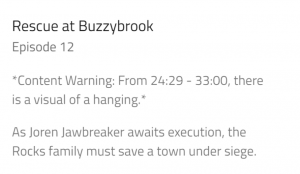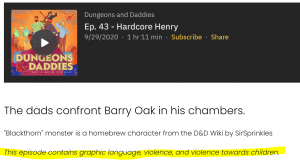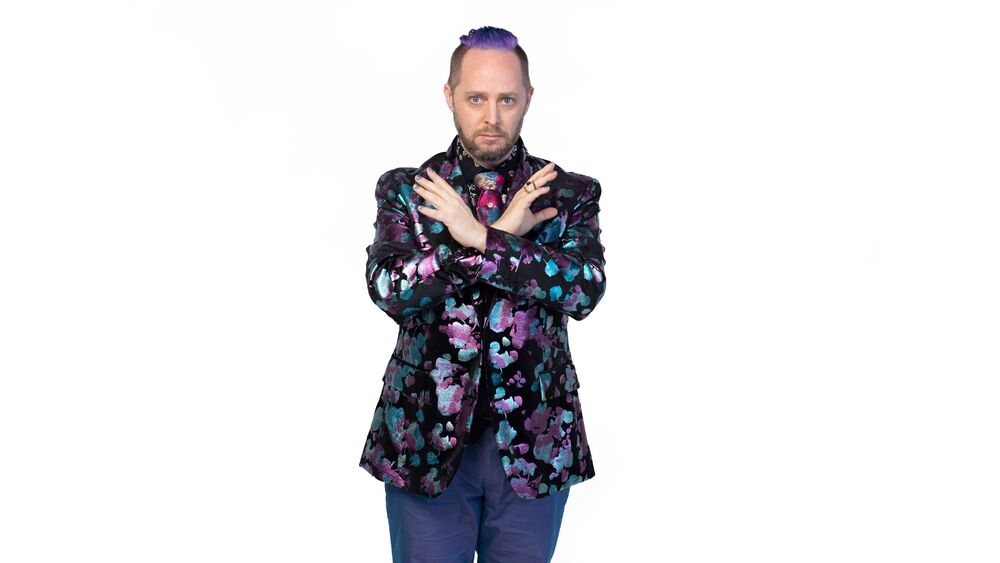Content Warnings Play a Critical Role
Episode 129 of Critical Role sparked debate online over whether or not the popular Dungeons & Dragons actual play show should begin including content warnings before their episodes air. There are currently no specific content warnings that appear before the episodes air, nor are there any in the episode descriptions.
Because of the nature of this article, from this point on there will be some light but unspecified spoilers as well as touching on the same subject that brought this debate to a head.
Content Warning: Child Death, violent in nature.
Episode 129 of Critical Role, “Between a Rock and a Hot Place” had many viewers calling for content warnings after a child NPC was killed in a battle the players accidentally got him tied up in. It was sudden and violent, and though he was later brought back to life, several people pointed out that a simple warning would have let them know that they should sit this episode out.
Others were quick to show that Critical Role has already addressed the topic of content warnings on their website stating:
“Due to the improv nature of Critical Role and other RPG content on our channels, some themes and situations that occur in-game may be difficult for some to handle. If certain episodes or scenes become uncomfortable, we strongly suggest taking a break or skipping that particular episode.
Your health and well-being is important to us and Psycom has a great list of international mental health resources here, in case it’s useful.”
The general opinion of people bringing up this statement is that it proves Critical Role has already given out an adequate content warning. I believe that’s inaccurate, as the purpose of content warnings is to be useful. What is currently on the official website (and was also added to the more recent episode’s YouTube descriptions) is vague and unhelpful.
There are a couple of misunderstandings about the concept of possible content warnings that I think the dissenters are getting tied down in that I’d like to address.
While wading through the various arguments online it feels like some people are equating content warnings with an admittance that the content in question is “problematic” or “bad”, and that’s not at all what content warnings mean.
It’s absolutely fine to explore darker themes in fiction. Many people find it cathartic and helpful to be able to look at these subjects from an outside perspective. It’s fine, and it’s normal. However, not all people are the same, and when you’re reaching as wide of an audience as Critical Role is, having a simple warning about the darker subjects you’ll be touching on beforehand to give a heads-up to those who may have past trauma in that area is helpful. It’s not “admitting fault” as some people seem to think it is. It’s not an attack on the cast or crew – it’s giving agency to your viewers on whether or not to engage.
Another argument that is brought up is that it would be impossible for Critical Role to add content warnings as they’re an improvised show.

Not only is adding content warnings possible for a D&D actual play show to do, it is actively being done by other actual play shows all of the time. Dimension 20 regularly adds major content warnings to the descriptions of their videos and also tweets them out.
Dungeons & Daddies (not a BDSM podcast) also includes content warnings in their episode descriptions.

In fact, as of right now, Critical Role is being recorded in advance because of the current pandemic. This means that they know the content of the show before it’s aired to its viewers and could add any necessary content warnings. If they ever go back to airing live, they could still add the warnings in the YouTube video that’s released four days later, or their weekly newsletter. If shows with a much lower viewer count can do this, then Critical Role should be able to as well.
During their Between the Sheets episodes, Critical Role did actually have a content warning for Marisha Ray’s episode, which dealt with sexual assault, and that makes me think that issue of not giving content warnings for Critical Role lies in being hesitant about spoilers.
I understand that the nature of spoilers is a hot topic that people are passionate about, but I can only say that people who need the warnings will always appreciate the heads-up over being spoiled. Content warnings are more important than spoilers. That being said, it should be fairly simple to add the warnings in a way that are skippable to people who don’t need to see them and are sensitive to spoilers, such as adding them to the episode’s description on the YouTube video.
People also seem to think that saying, “It’s D&D. It’s going to get dark,” is enough of a warning.
It absolutely isn’t enough. I’ve been at plenty D&D tables where the first thing discussed as a hard red line for the group was “child death” to know that it isn’t enough. “Dark” as a blanket statement is incredibly vague and does nothing to help people know what’s coming. Everyone’s definition of “dark” subject matter will be different. Being explicit in labelling it as “child death” or “violence towards children” will be a lot more helpful to those who know they have a hard time handling those specific subjects.
One of the least helpful arguments to the contrary has simply been, “If you don’t like it, don’t watch it.”
Without content warnings, by the time a person is able to decide that subject matter is too much for them to handle it’s already been seen. Content warnings actually help people decide not to watch it if they don’t like it! That is the entire point of their existence.
Finally, I’ve seen many people claim that Critical Role doesn’t need to add content warnings to their shows… and those people would be correct. They don’t need to. They have no legal or moral obligation to do anything like what is being asked of them.
But, Critical Role ends every episode by saying the – now iconic – phrase: “Don’t forget to love each other,” which is a beautiful sentiment that I hope will be applied to this discussion.
Content warnings are about empathy. They’re rooted in the general desire to care for other people. I am someone who generally doesn’t bother to look at content warnings when they’re given and I am very privileged to be able to do that. However, when I see that I’m engaging with creators who regularly give content warnings when they’re needed, I know that those creators care enough about the community around them to do more than vaguely gesture towards a mental health link.
I’ve been a big fan of Critical Role for many years now – dating back to their Vox Machina days. My criticism of this subject doesn’t mean I don’t still love the show and the people who create it – I just think we should be open to a discussion on how to add these content warnings for the people who need them. I have hope that Critical Role will reach a point where they can give these tools out to help their viewers instead of alienating some of their fanbase who may feel like they need to stop watching altogether.
The good news is that there is a fan project that was made in response to episode 129 called CritRoleCW, and fans can go there if they need to skim the content warnings. They’re working to have content warnings out quickly for future episodes, as well as adding them to past episodes.
It’s amazing that fans have taken this mantle upon themselves, but it’s also a shame that they had to.
On Critical Role’s website under their Value Statement, they say,
“We listen to community feedback to find ways to improve our processes, whether it’s internally or externally.”
I hope that they’ve been listening to the feedback that’s been discussed in these past few weeks – because adding content warnings would absolutely be an improvement of their current process, and a helpful hand to many current and future fans of the show.
Author: Michaela Labit
Help support independent journalism. Subscribe to our Patreon.
Copyright © The Geekiary
Do not copy our content in whole to other websites. If you are reading this anywhere besides TheGeekiary.com, it has been stolen.Read our








This could be easily resolved by giving a section that a viewer themselves can choose to click to reveal a content warning, should they choose. Those who don’t feel the need, need not click. Those who do, can.
Admitting fault is not the issue. Telegraphing a particularly emotional episode is. Preparing people, whether the show is pre-recorded or not, removes one of the most powerful things that makes a show like this unique… the complete lack of emotional preparedness that mimics real life. The show is not scripted, so a viewer enters each episode knowing that ANYTHING reasonable could happen. There is no plot armor, and this creates a level of emotional investment no scripted show can easily match. To warn ahead of time removes a great deal of that power.
Yes, “Between the Sheets” has content warnings. But Between the sheets is an interview of actors’/artists’ thoughts, beliefs, and real life experiences, both positive and negative. There is nothing to be spoiled and no sense of feeling “things could take a drastic turn based on roleplaying, risk, and a die roll”. An interview is not roleplaying and does not carry the same sense of personal investment, character attachment, vulnerability, and relatability.
So, I do fall into the camp that empathy for those who don’t wish to have sensitive issues triggered is more important than, “spoiling” the emotional impact for another viewer. I just don’t think its a question with a black and white answer. I think both those who do and those who don’t want a content warning telegraphing a particular episode’s emotional impact can be served, and both can be respected while allowing a viewer to maintain some personal control for what they do and don’t want telegraphed in advance. I worry that to blanket things like content warnings for everyone would remove a particular power the show has for some.
Thank you for the article. I already went quite long, but this is a subject that I think we both could agree could still use even more thought and discussion. I don’t think there is a perfect right or wrong. I think it comes down to levels of empathy balanced with responsibility.
(There is something to be said that “real life doesn’t come with content warnings”, and it is the closer reflection of real-life that makes a show like this so powerful. But that itself can lack empathy if we don’t consider that a show is still NOT real-life, and so something as simple as a content warning aimed at a self selecting portion of the audience can be accomplished with a little brainstorming).
While I appreciate the concern people have about heavy content and Critical Role, and protecting vulnerable communities, it seems that many discussions if this have cut said communities out entirely.
I’m one of the people this project is supposed to protect, and the general attitude surrounding it, the attitude of “saving” people from their truama really rubs me wrong. I actively use content warnings for media and generally support them, but every aspect of this approach in the community has fallen flat.
You assert that content warnings need to be more specific to be useful, and that they need to be useful to be worthwhile. The cr cw project took over a week to fix an easily checkable character death in their official list. Many of their other warnings are confusing at best, or downright absurd, such as “warning, graphic plant suffocation” on a comedy bit.
On top of that, because they have rushed into this project with little experience, treating it like a game, they have directly hurt me, triggering me and causing. A me tal health spiral worse than critical role itself ever has. When I and others spoke up we were dismissed for our tones and for “not understanding” or mislabeled as making it about other drama, or even demonized as saying we don’t care about the issue at all.
Additionally, the cr community has long had ways of warning for content that could be sensitive beyond the general warning cr provides. Crit Role Stats live tweets weekly, indicating brief summaries of what’s happening in a clear and unbiased manner. The critical role fan wiki has full episode summaries up within 24 hours if you need to wait and watch via vod or YouTube. And critrole recap is published weekly by Dani Care, an official and detailed recap of what happens in a non graphic manner. Beyond this, the cr community itself is very welcoming, and every critter I know personally has offered to give others either heads up about personal triggers or full on summaries for anyone who missed live for any reason.
Content warnings are important tools, but in some cases it is difficult to implement them specifically. 4 hours of live improv content is much harder to warn for than hour long edited podcasts. Additionally, cr is a groundbreaker in many senses, and unlike shows hat have come after, it has had to forge its own path. Implementing warnings on the scope this project seems to desire takes more than a week. It takes a lot of time and a lot of money to be done well and sensitively, and critical role is still in fact an indie production running in house and currently, mostly from home.
Those of us who need cws can adovacte for ourselves and manage our own mental health. We don’t need others to dictate for us what we do or don’t need. We don’t need spokespeople, or pity, or saving. Many of us understand that “this may contain dark and violent themes, viewer discretion is advised” is in itself a form of warning, and if we aren’t in a good place to engage that in full, that we can choose different ways to consume this media that we love, and still take care. Sometimes, people’s needs clash. Sometimes some needs aren’t reasonable to accomadate, especially not at scale. That’s ok, and it isn’t a moral failing on the part of anyone, even if they are a larger production. Some content isn’t going to be for everyone. And at this point, there’s more than enough content that has been labelled and documented by others for new people to test the waters of cr before diving in too deep and getting hurt.